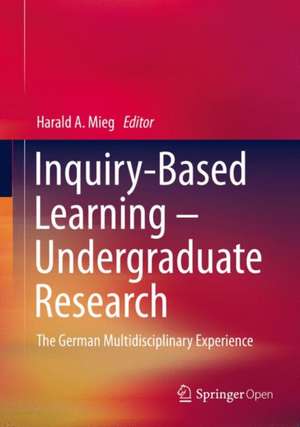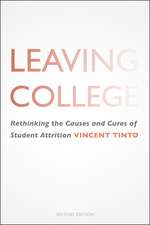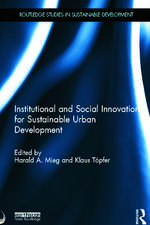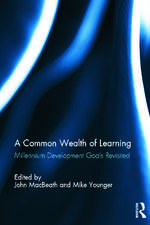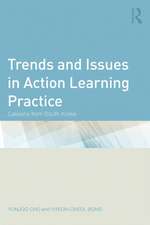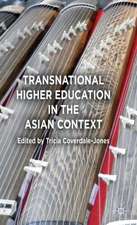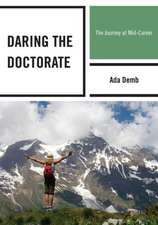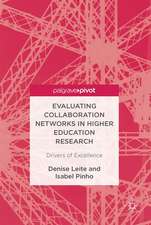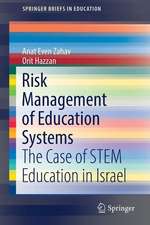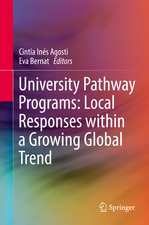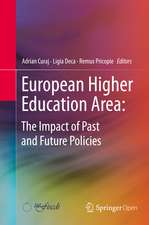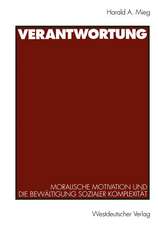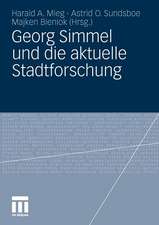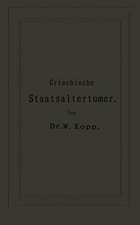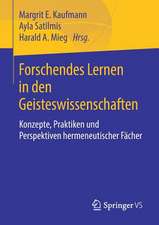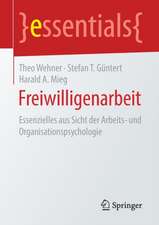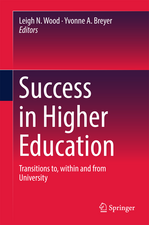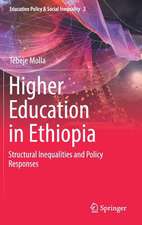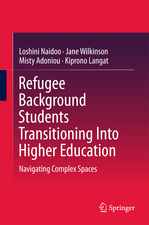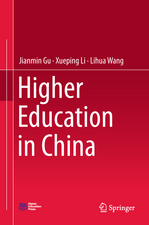Inquiry-Based Learning - Undergraduate Research: The German Multidisciplinary Experience
Editat de Harald A. Miegen Limba Engleză Hardback – 2 mai 2019
Today IBL and UR are essential parts of high-impact education strategies for universities around the world. In his university reform plans of the early 19th century, Wilhelm von Humboldt introduced Inquiry-Based Teaching and Learning as the core principle of the modern research university in Germany, as well as worldwide. IBL was re-discovered in the German university reform initiatives of the 1960s. Since then, IBL has been applied in teachers' education in German universities. The book presents IBL/UR experience as complementary to what is usually presented in English-speaking academia. In Germany, IBL/UR is applied broadly throughout the social sciences and planning, but not in the core sciences, whereas in the US undergraduate research is common in the sciences but less so in the social sciences. Moreover, in Germany, IBL/UR is often linked to applied and community-oriented research — something that is just emerging in the US.
Preț: 442.13 lei
Nou
Puncte Express: 663
Preț estimativ în valută:
84.60€ • 90.47$ • 70.54£
84.60€ • 90.47$ • 70.54£
Carte disponibilă
Livrare economică 28 martie-11 aprilie
Preluare comenzi: 021 569.72.76
Specificații
ISBN-13: 9783030142223
ISBN-10: 3030142221
Pagini: 406
Ilustrații: XVI, 406 p. 46 illus., 6 illus. in color.
Dimensiuni: 168 x 240 mm
Greutate: 0.91 kg
Ediția:1st ed. 2019
Editura: Springer International Publishing
Colecția Springer
Locul publicării:Cham, Switzerland
ISBN-10: 3030142221
Pagini: 406
Ilustrații: XVI, 406 p. 46 illus., 6 illus. in color.
Dimensiuni: 168 x 240 mm
Greutate: 0.91 kg
Ediția:1st ed. 2019
Editura: Springer International Publishing
Colecția Springer
Locul publicării:Cham, Switzerland
Cuprins
Foreword.- Preface.- Introduction.- Part 1: Principles.- Concepts and Cases: Science Studies on IBL.- Focus on Learning.- Processes and Capabilities of Self-Learning.- Research-Oriented Learning and Teaching from a Didactic View.- The Turn "From Teaching to Learning": Towards a Student-Centered Learning Culture.- Focus on Research.- Development of Competences through IBL.- Research-Oriented Study Programs as Enculturation to Science.- Reflection.- Focus on Curricula.- Examinations and IBL.- The Peer-to Peer Principle of IBL.- Inter- and Transdisciplinarity.- Part 2: Disciplines.- I) Professionalizing Disciplines.- Teachers' Education and IBL.- Social Work and IBL.- Information Science and IBL.- II) Life Sciences.- Medicine and IBL.- (Natural) Life Sciences and IBL.- Health Sciences and IBL.- III) STEM.- Mathematics and IBL.- (Natural) Sciences and IBL.- Engineering and IBL.- IV) Arts and Design.- The Arts and IBL.- Design and IBL.- Architecture and IBL.- Specific Disciplines.- Business Administration and IBL.- Cultural Studies and IBL.- Geography and IBL.- Historical Studies and IBL.- Law and IBL.- Philosophy and IBL.- Sports and IBL.- Sustainability Studies and IBL.- Theology and IBL.- Part 3: Perspectives.- IBL as an Academic Profile: Bremen University.- IBL from the Perspective of Applied Universities.- IBL and Digital Media.- IBL and Diversity.- Perspectives for Economy and Society.
Notă biografică
Harald A. Mieg is (honorary) professor of Metropolitan Studies at the Humboldt-Universität zu Berlin and also affiliated to the Swiss Federal Institute of Technology, Zurich. The focus of his research is on planning processes in cities and research methodologies. He was the initiator and coordinator of a German national research project on undergraduate research in Germany ("ForschenLernen," lasting 2014-2018, 15 universities involved). In this context, he coordinated the edition of a series of books on undergraduate research and inquiry-based learning in Germany.
Textul de pe ultima copertă
This open access book provides a systematic overview of experiences with Inquiry-Based Learning (IBL) and undergraduate research (UR) in German universities, covering both research universities (Universitäten) and universities of applied sciences (Fachhochschulen). Divided into three parts, the book starts with the principles and common practices of IBL/UR at all universities. Part Two discusses the implementation of IBL/UR for twenty-one individual disciplines, ranging from architecture to theology. Part Three discusses the potential of IBL/UR in relation to several topics including diversity, digitalisation, different forms of universities, and the national job market. The book summarises the project of the German network of UR, comprising approximately 50 universities, and results of a national initiative called Qualitätspakt Lehre which is intended to improve teaching at German universities.
Today IBL and UR are essential parts of high-impact education strategies for universities around the world. In his university reform plans of the early 19th century, Wilhelm von Humboldt introduced Inquiry-Based Teaching and Learning as the core principle of the modern research university in Germany, as well as worldwide. IBL was re-discovered in the German university reform initiatives of the 1960s. Since then, IBL has been applied in teachers' education in German universities. The book presents IBL/UR experience as complementary to what is usually presented in English-speaking academia. In Germany, IBL/UR is applied broadly throughout the social sciences and planning, but not in the core sciences, whereas in the US undergraduate research is common in the sciences but less so in the social sciences. Moreover, in Germany, IBL/UR is often linked to applied and community-oriented research — something that is just emerging in the US.
Today IBL and UR are essential parts of high-impact education strategies for universities around the world. In his university reform plans of the early 19th century, Wilhelm von Humboldt introduced Inquiry-Based Teaching and Learning as the core principle of the modern research university in Germany, as well as worldwide. IBL was re-discovered in the German university reform initiatives of the 1960s. Since then, IBL has been applied in teachers' education in German universities. The book presents IBL/UR experience as complementary to what is usually presented in English-speaking academia. In Germany, IBL/UR is applied broadly throughout the social sciences and planning, but not in the core sciences, whereas in the US undergraduate research is common in the sciences but less so in the social sciences. Moreover, in Germany, IBL/UR is often linked to applied and community-oriented research — something that is just emerging in the US.
Caracteristici
Is truly multidisciplinary, presenting IBL and UR in over 20 disciplines
Systematically introduces principles and provides an overview of evidence
Brings together all major scholars in Germany working in the field of IBL/UR
Includes discussions on societal and education prospects
Is the translation of the German edition which has become the reference text for IBL/UR in German-speaking universities
Systematically introduces principles and provides an overview of evidence
Brings together all major scholars in Germany working in the field of IBL/UR
Includes discussions on societal and education prospects
Is the translation of the German edition which has become the reference text for IBL/UR in German-speaking universities
